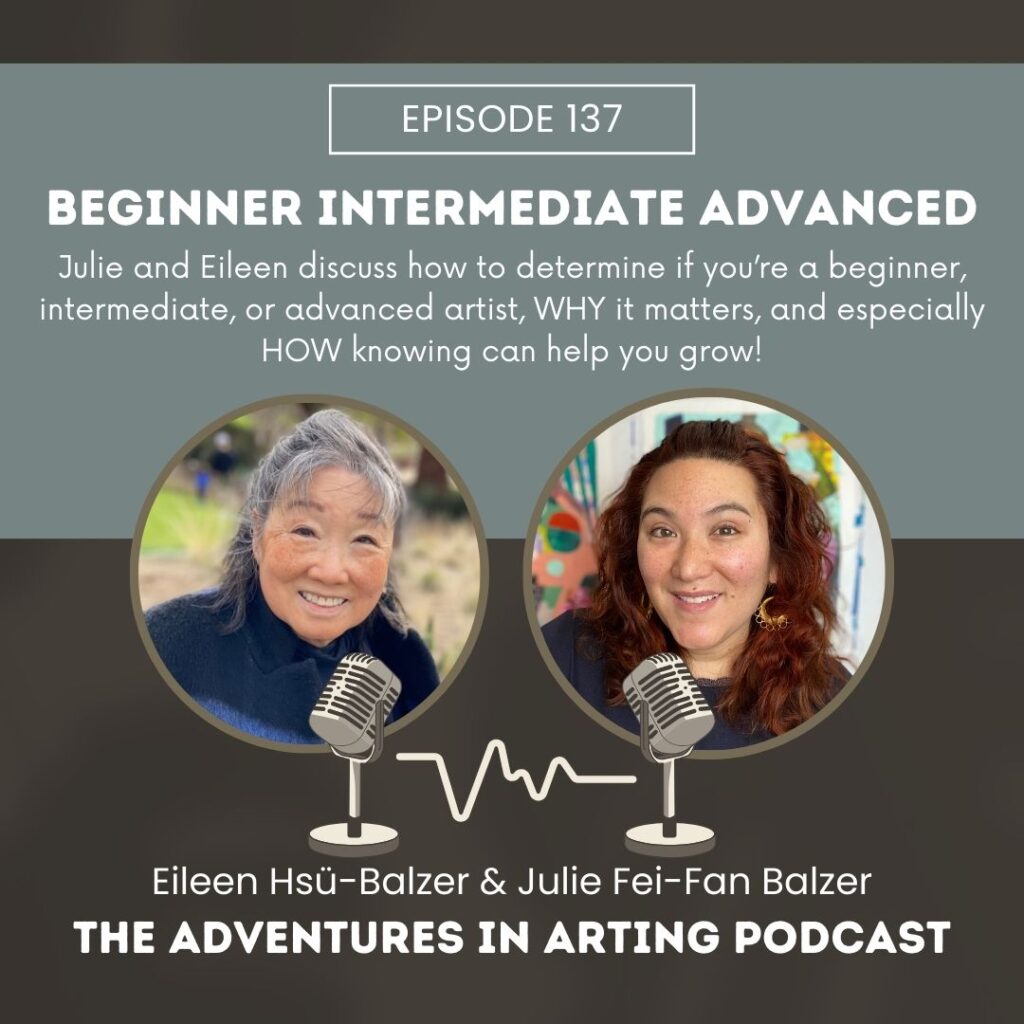Podcast: Play in new window | Embed
Subscribe: RSS
Defining the skill levels of artists, whether they are beginners, intermediate, or advanced, is somewhat subjective. But here are the divisions as I see them (it’s important to note that you can be an expert in one area and a beginner in another):
Technical Skills:
- Beginner: Limited Technical Skills
- Intermediate: Solid Technical Skills
- Advanced: High-Level Technical Proficiency
Composition:
- Beginner: Limited Composition Understanding
- Intermediate: Improved Composition
- Advanced: Advanced Composition Skills:
Style:
- Beginner: Exploring Phase
- Intermediate: Developing Style
- Advanced: Established Style
On the podcast we discuss some learning goals you might have based on your level:
- Beginner: For a beginning artist, the focus should be on building a foundation and exploring the fundamental aspects of art.
- Experimentation with Materials: Explore how different materials interact with each other.
- Explore the basics of color theory. Understand the color wheel, primary, secondary, and tertiary colors. Experiment with color combinations and how they evoke different emotions. Start with a limited color palette to avoid overwhelm. As you gain confidence, you can gradually expand and experiment with more colors.
- Experiment with different shapes in your compositions. Consider both geometric and organic shapes and how they interact with each other.
- Begin to understand basic composition principles such as balance, symmetry, and asymmetry. Explore how the placement of elements can create a sense of harmony or tension.
- Embrace the notion that mistakes can lead to interesting outcomes. Be open to unexpected results and see them as opportunities for creative exploration.
- Study the works of other artists. Observe their techniques, color choices, and compositions to gain inspiration and insights.
- Reflect on your own work. Consider what you enjoy creating and what elements you find most interesting. Use this reflection to guide your future explorations.
- Join art communities, either online or locally, to share your work, receive feedback, and connect with other artists. Remember that the beginning stage is about exploration and finding your artistic voice. Enjoy the process of discovery and don’t be afraid to take risks and try new things as you embark on your artistic journey.
- Intermediate:
- Explore and experiment with various composition techniques, such as balance, asymmetry, and focal points.
- Develop a deeper understanding of color theory and experiment with creating harmonious color palettes.
- Consider how the scale and proportion of elements in your artwork contribute to the overall visual impact.
- Work towards developing a consistent style that reflects your unique voice as an artist.
- Reflect on the meaning and intention behind your work, and consider developing an artist statement that articulates your approach.
- Study art movements and artists throughout history to gain inspiration and insight into different approaches.
- Advanced:
- Continue experimenting with innovative techniques and processes. Develop your expertise in specialized techniques within chosen mediums, pushing the boundaries of traditional methods.
- Develop a deeper understanding of the conceptual aspects of your work. Consider the underlying themes, narratives, or philosophical ideas you want to convey through your art.
- Reflect on and articulate your artistic philosophy. What drives your creative process, and what messages or emotions do you aim to communicate through your abstract work?
- Experiment with large-scale works and installations. Consider how the size and placement of your artwork influence the viewer’s experience and engagement.
- Engage in research relevant to your artistic practice. This could involve studying art history, philosophy, or contemporary trends to inform and enrich your work.
- Deepen the use of personal symbols or motifs in your work, creating a symbolic language that is rich in meaning and resonance.
- Engage actively with the art community. Participate in exhibitions, residencies, and collaborative projects to expand your network and gain exposure.
- Participate in critical discourse about abstract art. Attend conferences, write articles, or engage in discussions to contribute to the broader conversation within the art world.
- Stay curious and continue exploring new ideas, themes, and techniques. The journey of an advanced artist is one of perpetual exploration and discovery. Remember that artistic growth is a lifelong process, and the most advanced artists are those who continually challenge themselves and remain open to new possibilities in their creative journey.
Sign up for my workshops, “Practical Color For Painters,” and “Design Boot Camp” to gain many of the skills listed above.
Links:
- Tip the Artist: PayPal.Me/balzerdesigns
- Sign up for the Friday FREE newsletter: https://forms.feedblitz.com/bco
- Monthly Membership: https://bit.ly/JulieMembership
- Take an online class: https://balzerdesigns.com/Classroom/
- Shop: https://www.juliebalzer.com/shop.html
- Let’s connect on instagram: https://www.instagram.com/balzerdesigns/
- Favorite Things: https://www.amazon.com/shop/balzerdesigns
Thanks for listening and subscribing!
